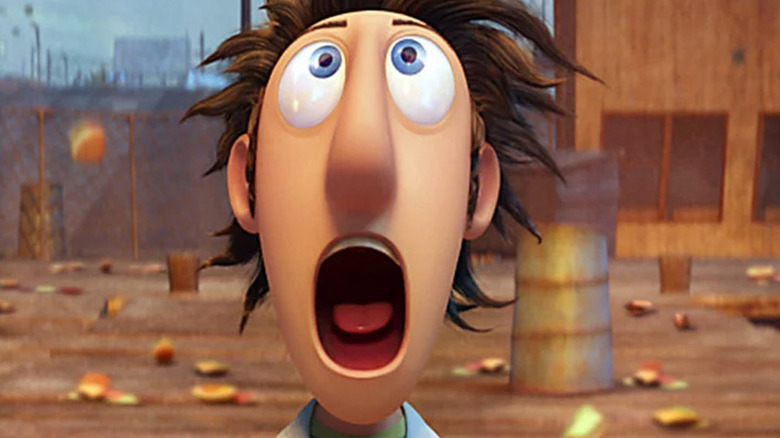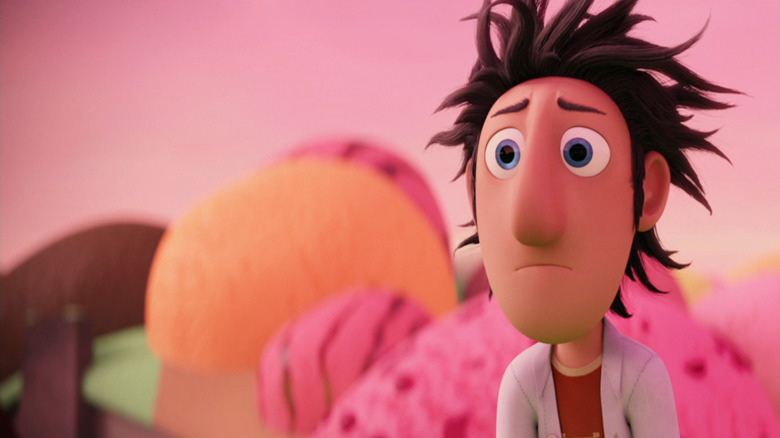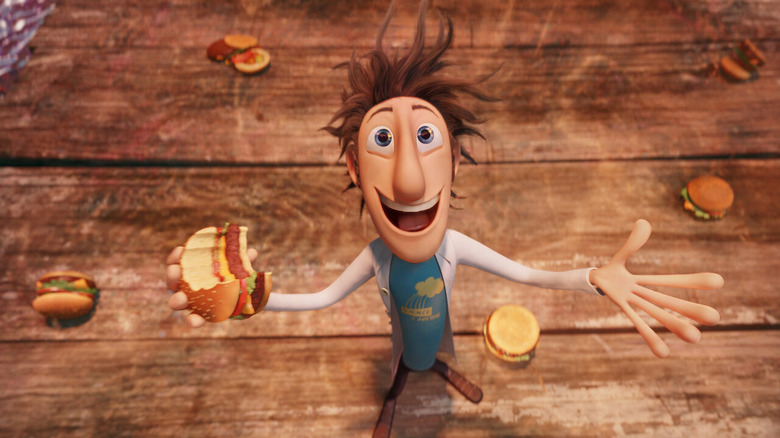Phil Lord & Chris Miller Had No Idea How To Make A Movie When Joining Cloudy With A Chance Of Meatballs
Phil Lord and Chris Miller have been two of my favorite creators for years. I was probably too young to be watching "Clone High" when it aired on MTV from 2002-2003, but best believe I was immediately transported back to seventh grade when it was announced the series would be soon getting a reboot for Paramount+. In the years that followed, Lord and Miller have had their hands on a number of projects I absolutely adore ("The Lego Movie," "Spider-Man: Into the Spider-Verse," "21 Jump Street," "The Last Man on Earth," etc.), as well as producing "The Mitchells vs. The Machines," which was undoubtedly my favorite film of 2021.
The duo has become go-to partners for animated features, but as some of the first people to work under the Sony Pictures Animation banner, it wasn't always smooth sailing. The Wrap recently published a look at the first 20 years of the company, which includes the rise of Lord and Miller. "The drywall was barely up," Lord joked about entering the studio for the first time. "It was very, very early days. They were developing a 'Hotel Transylvania' movie and they had been trying to develop a 'Cloudy with a Chance of Meatballs' movie but had no luck." When Sony Pictures Animation was first formed, they announced a slew of projects including "Open Season" and "Surf's Up." Among the initial announcement was "Cloudy with a Chance of Meatballs," a project that interested Lord and Miller following their first general meeting.
There was only one problem — Lord and Miller had never made a movie before, and had no idea how the studio system worked.
'We didn't actually have any ideas'
According to The Wrap, Phil Lord and Chris Miller told Sony Pictures Animation that they had "a lot of ideas" about a possible "Cloudy with a Chance of Meatballs" movie, which inspired the studio to invite them to pitch on the project. "We didn't actually have any ideas," Miller says. "We just liked the book." Lord joked that the executives invited the duo to come the next day, to which they replied, "How about the day after tomorrow?" With a little bit of stolen time, the two pulled an all-nighter working on their pitch, despite having never written a movie before. As history shows, their pitch was a success, and the two directed the film which spawned a sequel and TV series adaptation.
However, the two were at one point removed from the project for creative differences but later asked to return. "I remember they kept telling us the movie was greenlit," Lord said. "We were a year in and they were like 'Good news, they greenlit the movie, it's going to get made.' We're like, 'Great.' And then a year later they had this big meeting where they told us, 'Congratulations. The movie's greenlit.'"
Sound confusing? It was for Lord and Miller, too. As it turns out, what this meant was that Sony Pictures Animation had hit a point where the film had to be released, otherwise they would be spending even more money not to release it. "We're like, 'Hooray, I guess? Is this where we pop the champagne or...?'" Miller said.
Finishing on their own terms
It was clear that Sony Pictures Animation was nervous about the film, and whether or not it fell in line with what the executives deemed "A Sony Pictures Animation film." From what Phil Lord tells The Wrap, "If they had canceled the movie, then the blame would've been on the executives, but if they finished the movie and it's bad, they can blame Chris and Phil. So they went ahead and finished." Luckily for all, the film was a hit.
"Ultimately, one thing that was really great was that it's a studio that didn't have a long legacy of 'this is how we do things here,' which is a great advantage to people like us who always want to do things differently," Miller says. "We wanted to make a movie that looked like Muppet-y and cartoony and at the time people were not doing that in studio animated features." Sony Pictures Animation took a risk by allowing Lord and Miller to make the film as they saw fit, and it paid off tenfold.


